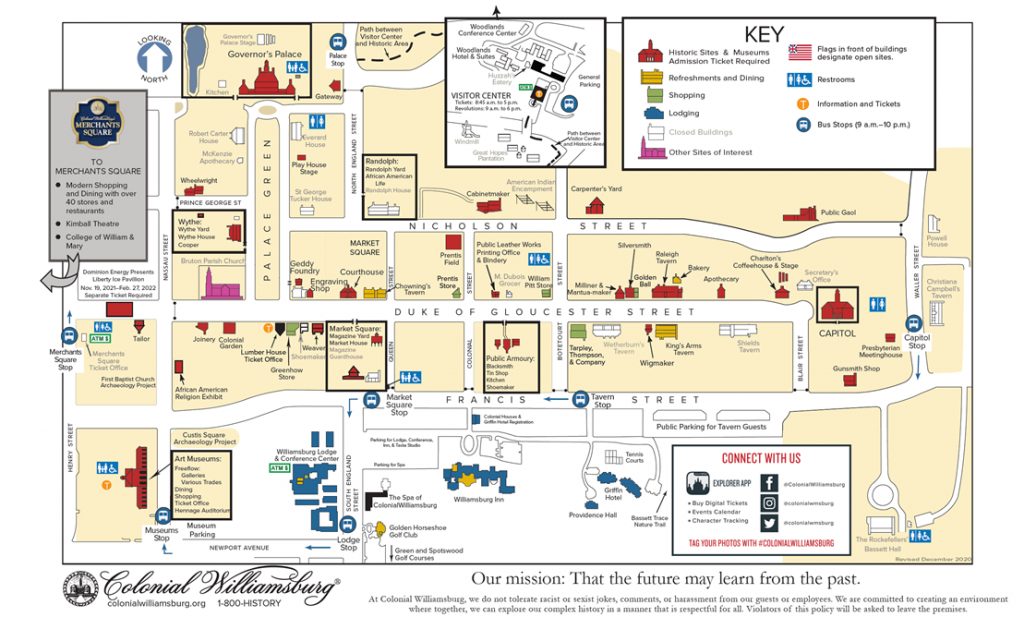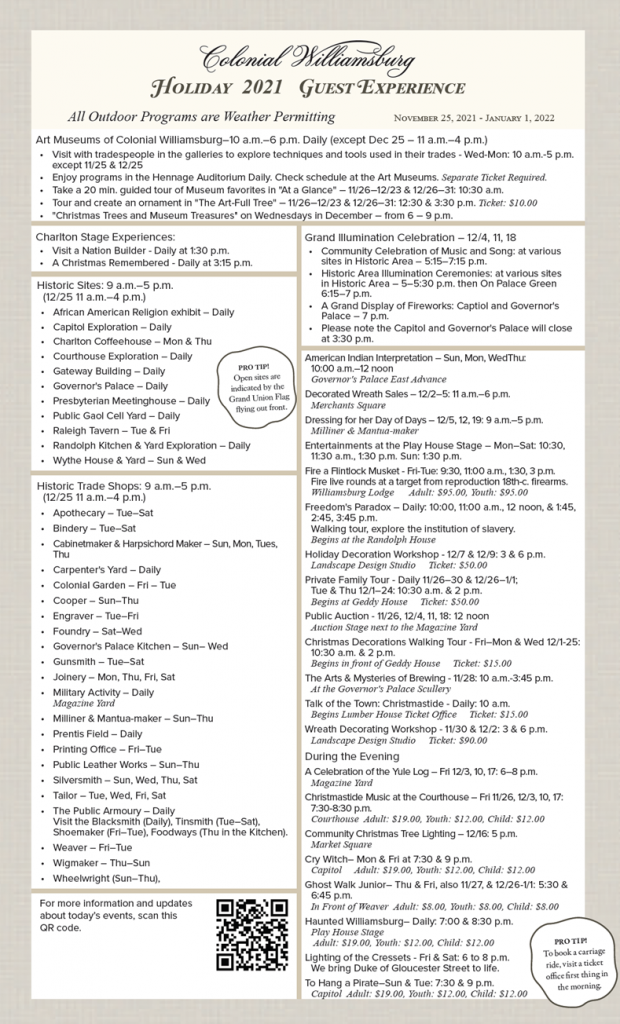Colonial Williamsburg Field Trip
| Instructor | Lily Daniels |
| Class/Level | University course (10 to 15 students) Level 5 Adult Learners |
| Time | 50 minutes |
| Topic | Colonial Williamsburg Field Trip |
| Skill(s) in Focus | Using the internet to find reputable information Reading a map Asking for directions Giving directions Planning a trip |
| Goal(s) | To feel confident reading a map, planning a trip, and going the Colonial Williamsburg as a class. |
| Objectives | By the end of the lesson students will be able to: Define vocabulary about historic trades Use a map to give directions Plan a fieldtrip |
| Materials | Vocabulary handout (Appendix A: Historic Trades Vocabulary) Colonial Williamsburg Map (Appendix B: Map) CW Guest Experience flyer (Appendix : Guest Experience) PowerPoint presentation (“Colonial Williamsburg Field Trip PPT”) |
Class Description
Activity 1: Warm-up: Review Homework (10 minutes)
Participation Framework: Whole class
Objective # 1
- T ask questions about the homework (Appendix A: Historic Trades Vocabulary) (PPT 2). For example,
Which occupation sounded like the most fun and why?
What does a cooper do?
What is an example of a compound word?
What is the difference between a blacksmith and a silversmith? Why are they separate trades?
What is the modern name for an Apothecary?
Wrap up and transition: “…If there aren’t any other questions about homework, we will move on to our main lesson. Learning vocabulary word for the historic trades was important because the theme of today’s lesson is Colonial Williamsburg. We will start by practicing giving direction based on this map of Colonial Williamsburg. Do you recognize some familiar vocabulary words?…”
Activity 2: Reading a map (15 minutes)
Participation Framework: Pairs
Objective # 1 and #2
- T provides each pair with 1 handout (Appendix B: Map)
- T introduces the activity (PPT 3) and goes over examples
- Ss practice asking each for directions
For example,
S1: How do you get from Bruton Parish Church to Carpenter’s Yard?
S2: Head straight down Duke of Gloucester Street past the Courthouse and Public Armoury. Then, turn left onto Botetourt Street. Next, turn right at Nicholson Street, and the Carpenter’s Yard will be the first building on your right.
- T assess Ss’ proficiency by visiting each pair and asking them for directions.
Activity 3: Planning a trip (25 minutes)
Participation Framework: Groups of 3-4 / Whole Class
Objective #2 and #3
- T goes over “Planning a Trip: What makes a good itinerary” (PPT 2)
- T provides each group with 1 handout (Appendix : Guest Experience)
- T introduces the flyer and asks if Ss have any questions
- Ss work together to plan a day trip to Colonial Williamsburg and are allowed to use phones (See QR code). Include
- At least three activities form “Guest Experience”
- two meals
- direction information (use the map)
- Each groups shares their itinerary (and use the map to give directions)
- Ss votes on their favorite plan
- (Class goes on the field trip later that month)
Wrap up and transition: “…Thank you so much for your participation today. I’m looking forward to our class fieldtrip…You can get a head start on your Blackboard homework, but it isn’t due until next Friday. have a good weekend…”
Appendix A: Historic Trades Vocabulary
Here is a list of common kinds of shops and occupations during the Colonial Period (1607 – 1776). Use the internet to answer the following questions.
Shops
For each kind of shop answer the question “What do the shop owners do? What is sold here?”
- Apothecary
- Armoury
- Bindery
- Joinery
Occupations
For each kind of occupation answer the question “What does this individual do? What do they make?”
- Blacksmith
- Cooper
- Engraver
- Harpiscordmaker
- Mantua-maker
- Milliner
- Silversmith
- Tailor
- Weaver
- Wheelwright
Appendix B: Map

Appendix C: Guest Experience

PDF Version
 Loading…
Loading…
PowerPoint Presentation
 Loading…
Loading…